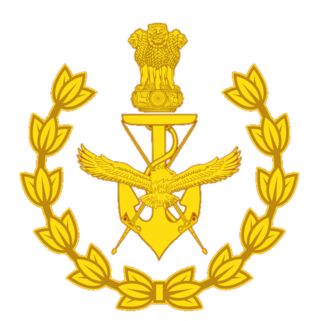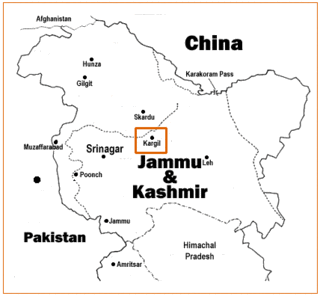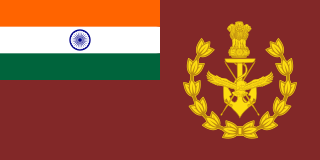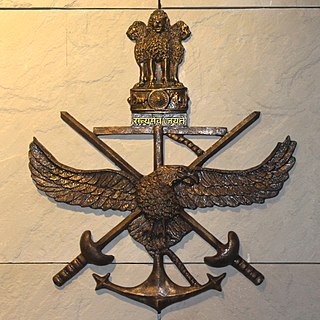
The Chief of the Army Staff (COAS) is a statutory office held by the professional head of the Indian Army (IA), the land forces branch of the Indian Armed Forces. Customarily held by a four-star general officer, the COAS is the senior-most operational officer of the IA, tasked with the roles of overseeing the overall functioning of the force during peace and wartime, committing to the preparation and maintenance of the force's operational effectiveness and defending the nation's territorial integrity and sovereignty.
The Nuclear Command Authority (NCA) of India is the authority responsible for command, control and operational decisions regarding India's nuclear weapons programme. It comprises a Political Council headed by the Prime Minister of India and an Executive Council headed by the National Security Advisor.
The National Security Council (NSC) of India is an executive government body tasked with advising the prime Minister of India on matters of national security and foreign policy. It was established by the former prime minister of India Atal Bihari Vajpayee on 19 November 1998, with Brajesh Mishra as the first National Security Advisor.

The Joint Chiefs of Staff Committee (JCSC), ; is an administrative body of senior high-ranking uniformed military leaders of the unified Pakistan Armed Forces who advises the civilian government of Pakistan, National Security Council, Defence minister, president and prime minister of Pakistan on important military and non-military strategic matters. It is defined by statute, and consists of a chairman, the military chiefs from Army, Navy and the Air Force: all four-star officers appointed by the president, on the advice of the prime minister. The chairman is selected based on seniority and merit from the chiefs of service of the three branches of the Pakistan Armed and Defense Services. Each service chief, outside their Joint Chiefs of Staff obligations, performs their duty directly for the ministry of Defence.

The National Command Authority (NCA) is the authority responsible for safeguarding the national security of Pakistan through command, control and operational decisions regarding Pakistan's nuclear weapons programme.

The Chief of the Air Staff (CAS) is a statutory office held by the professional head of the Indian Air Force (IAF), the aerial branch of the Indian Armed Forces. Customarily held by a four-star air chief marshal, the CAS is the senior-most operational officer of the IAF, mandated with the responsibilities of supervising the force's overall functioning during states of peace and wartime, committing to the establishment-cum-continuity of air deterrence and executing India's security objectives vis-à-vis the preservation of the country's air sovereignty.

The Ministry of Defence (MoD) or Raksha Mantralay is charged with coordinating and supervising all agencies and functions of the government relating directly to national security and the Indian Armed Forces. The President of India is the ceremonial commander-in-chief of the armed forces of the country. The Ministry of Defence provides policy framework and resources to the armed forces to discharge their responsibility in the context of the country's defence. The Indian Armed Forces and Indian Coast Guard under the Ministry of Defence are primarily responsible for ensuring the territorial integrity of India.

The Chief of the Naval Staff (CNS) is a statutory office held by the professional head of the Indian Navy (IN), the naval branch of the Indian Armed Forces. Customarily held by a four-star admiral, the CNS is the senior-most operational officer of the IN, tasked with the roles of overseeing the force's overall functioning during states of peace and conflict, along with the realization of India's strategic maritime objectives, namely, the defence of the country's sovereignty against maritime threats and the security of international sea lines in the Indo-Pacific.
The National Security Strategy (NSS) of India has not been defined since its Independence in 1947. Framing an NSS has remained a major policy goal and challenge of successive Indian governments.

The Integrated Defence Staff (IDS) is an organisation responsible for fostering coordination and enabling prioritisation across the different branches of the Indian Armed Forces. It is composed of representatives from the Indian Army, Indian Navy, Indian Air Force, Ministry of External Affairs, Defence Research and Development Organisation (DRDO), Ministry of Defence and Ministry of Finance. The IDS is headed by Chief of Integrated Defence Staff along with Deputy Chiefs of Integrated Defence Staff. On December 24, 2019, the Cabinet Committee on Security (CCS) established the post of Chief of Defence Staff, a four-star general, a tri-service Chief, that shall lead the defence forces as well as play the role of head of the Department of Military Affairs. The body advises and assists the Chief of Defence Staff.

The Chiefs of Staff Committee (COSC) is an administrative forum of the senior-most military leaders of the Indian Armed Forces, which advises the Government of India on all military and strategic matters deemed privy to military coordination, direction and policy between the country's three armed services. By organization, the COSC is comprised several key members, namely, Chief of Defence Staff - who acts as the Committee's Permanent Chairman, along with the Chief of the Army Staff, the Chief of the Naval Staff and the Chief of the Air Staff - all of whom are also additionally supported by the Chief of Integrated Defence Staff.

The Kargil Review Committee (KRC) was set up by the Government of India on 29 July 1999, three days after the end of the Kargil War. The committee was set up "to examine the sequence of events and make recommendations for the future".

The Defence Cyber Agency (DCyA) is an integrated tri-services agency of the Indian Armed Forces. Headquartered in New Delhi, the agency is tasked with handling cyber security threats. The DCyA draws personnel from all three branches of the Armed Forces. The head of the DCyA is an officer of two-star rank, and reports to the Chief of Defence Staff (CDS) through the Integrated Defence Staff (IDS).

The Chief of Defence Staff (CDS) is the principal military authority and senior-most appointment of the Indian Armed Forces. Deemed the overall professional head of India’s three armed services, namely, the Indian Army, the Indian Navy and the Indian Air Force, the CDS is the highest-ranking military officer in service, responsible for overseeing inter-service jointness across all disciplines related to military functioning. Primarily, the office operates on a status of primus inter pares i.e., first among equals with the chiefs of the three services, and functions as the Permanent-Chairman of the Chiefs of Staff Committee (COSC) – the inter-service syndicate responsible for ensuring the establishment and preservation of military integration.

The Armed Forces Special Operations Division (AFSOD) is an integrated tri-services division of the Indian Armed Forces. The division is tasked to carry out special operations. The AFSOD draws personnel from all three special warfare branches of the Indian Armed Forces.

The Defence Space Agency (DSA) is an integrated tri-services agency of the Indian Armed Forces headquartered in Bengaluru, Karnataka, India. The agency is tasked with operating the space-warfare and Satellite Intelligence assets of India. The DSA draws personnel from all three branches of the Armed Forces.

Integrated Theatre Commands of the Indian Armed Forces are varying degrees of synergy and cross-service cooperation between the military branches of the Armed Forces. Following Independence, in 1949 a joint educational framework was set up starting with the first tri-service academy in the world, the National Defence Academy, and over the years this joint educational framework has been expanded to bring officers from the different services together at different stages of their careers.
Maritime Theatre Command (MTC), previously referred to as Peninsular Command, is a proposed inegrated tri-services command of the Indian Armed Forces whose responsibilities may include the command and control of the entire Indian naval fleet and coastal defence operations. It is envisioned to include assets from all the branches of the Indian military.
Northern Theatre Command is a proposed Integrated Theatre Command of the Indian Armed Forces. The command will be responsible for looking after the 3,488 kilometres of the Line of Actual Control (LAC), India's de facto border with China, starting from Ladakh to Kibithu, Arunachal Pradesh.
Western Theatre Command is a proposed Inegrated Theatre Command of the Indian Armed Forces. The command will be responsible for looking after the India–Pakistan border starting from Siachen Glacier in north to Gujarat in south.






















